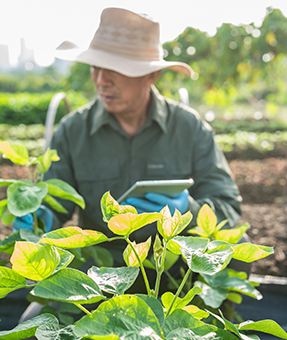Farm Sustainability Assessment 3.0 now available in Chinese
24th August 2022

Overview
SAI Platform’s FSA is becoming a valuable tool in the drive to achieve goals laid out in China’s national strategy for low-carbon development, rural revitalisation, and ecological civilisation.

Across China’s agriculture industry there is a growing interest in sustainable agriculture tools and methods. The past year has seen increasing demand for FSA implementation in China. There are currently over 20 active SAI Platform members in China implementing the FSA across eight provinces. With the FSA Chinese translation, now available to download from the FSA Resource Centre, SAI Platform’s China team continues to work with members and their suppliers to scale up FSA implementation in China.
SAI Platform’s membership continues to accelerate, and the FSA is rapidly expanding across new regions. As a response to the urgent need for greater accessibility for farmers around the globe, SAI Platform prioritised the translation of FSA 3.0. Now available in 22 languages, it is easier for users to implement FSA 3.0 accurately at a local level.
SAI Platform’s representative in China, BellaTerra Consulting, based in Beijing, has taken a leadership role in facilitating the translation and localisation of FSA 3.0. This comes at a pertinent time as companies and local and subnational governments are looking to international standards as well as expert technical support and guidance to implement more sustainable agriculture practices.
The translation was undertaken with an extensive peer review and consultation process. Chinese language experts helped to ensure the adaptability and suitability of the FSA in the Chinese context, while maintaining the integrity of the FSA as an international verification and benchmarking tool. To support and promote FSA implementation in China, SAI Platform are hosting a series of general online training sessions on FSA 3.0 in Chinese.

In recent years, China has issued a series of policy documents including zero growth of chemical fertilisers, organic fertiliser replacement, black soil protection actions, non-point source pollution control, biodiversity protection actions, and ecological civilisation construction. The FSA offers users a suitable approach to recognising Chinese policies and the scale of agricultural production in China. Regardless of whether it is a single independent farm or a joint farm, the FSA is adaptable to all farm sizes and different types of crop. This enables farms to identify suitable green development solutions according to local conditions.
China is a large agricultural producer, with a rich and diverse range of agricultural products; however, there is still much room for improvement.
As the domestic industry transitions to be more market-oriented, China’s agricultural development can greatly benefit from strengthening cooperation with international platforms like SAI Platform. The FSA helps farms at all stages of development, to establish their own continuous improvement programme to gradually achieve their sustainable agriculture goals.
“Each farm is unique. Only the production methods and management modes are different, and it is best practice to implement the development plan suitable for your own farm.”
Zhan Han, Agriculture Expert, BellaTerra Consulting Ltd.
The SAI Platform China Team is working with SAI Platform members and their suppliers to further understand the FSA principles and application criteria and prepare farms for implementation.
Opportunities for cross industry collaborative efforts, facilitated by SAI Platform, have already been identified, with members in China particularly interested in establishing a shared workstream for the local implementation of the FSA in corn production. For SAI Platform’s members and their suppliers, sourcing from FSA verified farms is important commercially, as well as the long-term aim of transitioning to more sustainable farming systems.
For more information on FSA implementation in China and the online training offered in Chinese, please contact Isabel Nepstad at isabel.nepstad@gmail.com.